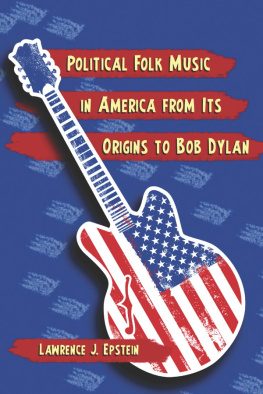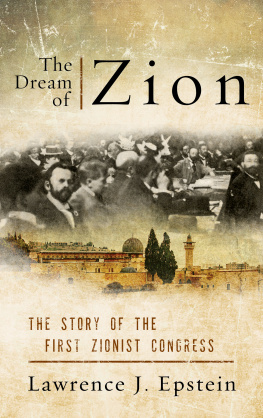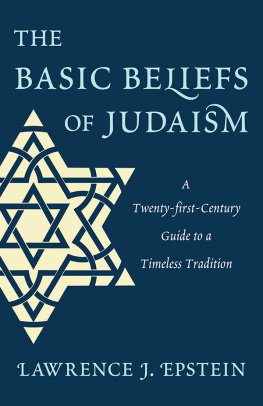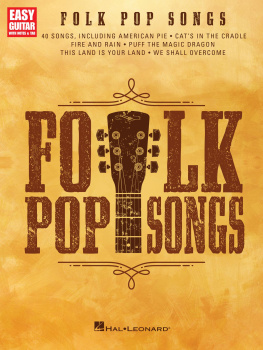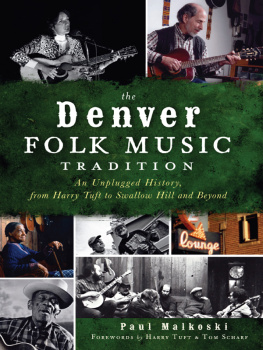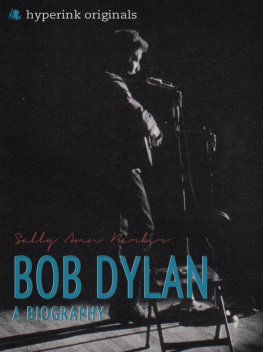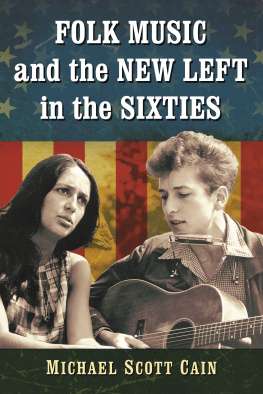
Table of Contents
LIBRARY OF CONGRESS CATALOGUING-IN-PUBLICATION DATA
Epstein, Lawrence J. (Lawrence Jeffrey)
Political folk music in America from its origins to Bob Dylan / Lawrence J. Epstein.
p. cm.
Includes bibliographical references and index.
ISBN 978-0-7864-4862-3
1. Folk musicPolitical aspectsUnited StatesHistory. I. Title.
ML3918.F65E67 2010
781.62'1301599dc22 2009054322
British Library cataloguing data are available
2010 Lawrence J. Epstein. All rights reserved
No part of this book may be reproduced or transmitted in any form or by any means, electronic or mechanical, including photocopying or recording, or by any information storage and retrieval system, without permission in writing from the publisher.
Front cover image 2010 Shutterstock
McFarland & Company, Inc., Publishers
Box 611, Jefferson, North Carolina 28640
www.mcfarlandpub.com
In memory of my mother
Lillian Scheinert Epstein
who taught me how to live.
Acknowledgments
It is a great pleasure to express my appreciation to the many people who were kind, generous with their time, and enormously helpful to me as I wrote this book.
I would like to thank the following people for agreeing to interviews, sometimes several of them, and being so extraordinarily intelligent and insightful: Mark Barkan, Dave Berger, Mitch Blank, Ed Blum, Oscar Brand, Paul Breines (e-mail), Cantor Bob Cohen, Ron Cohen, Ed Cray, David Dunaway, the late Mark Eastman, Barbara Gitlow Edge, Mary Jo Guthrie Edgmon, Mary Feidt, Carl Granich, Ann Guthrie, Nora Guthrie, John Earl Haynes (e-mail), Mark Allan Jackson, Danny Kalb, Ann Lauterbach, Peter Lefcourt (e-mail), Robbie Lieberman, Charlie McCoy (e-mail), Charles Miller, David Miller, Tom Paxton, D.A. Pennebaker, Ron Radosh, Millie Rahn, Douglas Rathgeb, Alan Rinzler, B.J. Rolfzen, Suze Rotolo (e-mail), Pete Seeger, Noel Stookey, John Szwed, Jennifer Warren, Josh White, Jr., Peter Yarrow, Izzy Young, and the late Henrietta Yurchenco.
Some of these people provided special help. In alphabetical order, they are:
Cantor Bob Cohen, who knew the folk scene so personally, was indefatigable in sending me materials from all over the place and being incredibly kind as he did so.
In his biography of Woody Guthrie, Ed Cray called Ron Cohen Folk Music Central. After receiving so much help and material from Ron, I know what Ed means. Whenever I had questions about folk materials, I knew Ron would help. He provided me with hundreds of pages of information about folk music. As if that were not enough, he gave the manuscript a meticulous reading under a tight deadline. While we sometimes had different approaches or interpretations, Ron made the manuscript subtler and more complex.
David Dunaway, Pete Seegers biographer, sent me original material and provided very useful insights for the direction of my book.
The late Mark Eastmans incredible story of his early encounters with Bob Dylan was truly remarkable. I interviewed him several times about these vital moments in Dylans life, and Mark was always gracious and extremely helpful.
Mary Jo Guthrie Edgmon, Woodys beloved sister, spoke to me on the phone for two minutes before inviting me over for some food. She has Woodys incredible sense of humor and his warm humanity, and I thoroughly enjoyed hearing her stories of Woodys life.
Mary Feidt, director of the wonderful documentary Tangled Up in Bob: Searching for Bob Dylan, provided some important suggestions for people to contact in Hibbing.
Dave Plant arranged for me to get a hard-to-find copy of an article from the Dylan magazine The Telegraph.
Ron Radosh, on whom I had to call more than once, has a unique perspective and an incredible amount of knowledge, both of which he was kind enough to offer as I thought through some of the issues of the book.
B.J. Rolfzen, Bob Dylans high school English teacher, was extremely helpful. He sent me his memoirs of growing up during the Great Depression and answered a wide variety of questions about his teaching methods, the results of which Dylan had so well absorbed.
Betsy Siggins of Club 47 in Cambridge made valuable suggestions.
Jason Smukler, a former student of mine, provided access to information.
Izzy Youngs kindness came through all the way from Sweden. He e-mailed and sent me materials and patiently answered my many questions about his pivotal role in Greenwich Village in the 1950s and 60s.
Finally, Id also like to thank an anonymous source close to Bob Dylan.
People either individually or from various organizations and archives provided much-needed materials or advice. Id like to thank Ray Allen of ISAM, the Institute for Studies in American Music; Hillel Arnold, formerly of the Woody Guthrie Archives; Peggy Bulger, Director of the American Folklife Center at the Library of Congress (and a former student of mine); Anna Canoni of the Woody Guthrie Archives; Robin Chen, Southern Folklife Collection Assistant at the University of North Carolina in Chapel Hill; Mark Damron, General Secretary Treasurer of the Industrial Workers of the World; Roy Eddey of the New-York Historical Society; Peter Filardo of the Tamiment Archives at New York University; the FBI for calling me to discuss the Freedom of Information Act materials I had requested; Richard Fliegel; Todd Harvey, Folklife Specialist at the American Folklife Center at the Library of Congress; Julie Herrada, Curator of the Labodie Collection at the University of Michigan; Dina Kellans of the Archives of Traditional Music at Indiana University; Sue Kriete, of the New-York Historical Society; Nancy Kuhl, of the Beinecke Rare Book and Manuscript Library at Yale University; William LeFevre, Reference Archivist at the Walter P. Reuther Library at Wayne State University; Zicel Maymudes; Dawn Olejar, Vice-President of Production Operations at CPI-Grand Entertainment; Robert Parks, Director of Library and Museum Services at the Morgan Library; Jeff Place, Archivist of the Ralph Rinzler Collection at the Smithsonian Center for Folklife and Culture; Rob Rosenthal, Professor of Sociology at Wesleyan University; Rodney A. Ross of the Center for Legislative Archives at the National Archives and Records Administration; Natalia Sciarini of the Beinecke Library at Yale; Maggie Skinner, Manager of Public Relations for the Experience Music Project; Jeffrey Taylor, Director of ISAM; and Doug Yeager of Yeager Productions.
Keith Condon played an unimaginably important role in shaping the book. His constant guidance and help was invaluable. I deeply appreciate his help.
My former colleagues and permanent friends in the English Department at Suffolk County Community College were unendingly kind in patiently listening to my tales about this book and providing much-needed emotional solace and support. All of them were like a wonderful extended family. Some provided materials for this book. David Axelrod found some early folk magazines and recalled his days wandering through the folk clubs. Maury Dean, author of books about music himself, was always a valuable source of suggestions and ideas. Tony DiFranco, my friend and office mate for more than thirty years, had to endure many questions from me because of his intelligence and capacity to explore and explain emotions. Sarah Kain Gutowski provided many valuable insights especially into contemporary music and suggested a very useful documentary and other materials. Doug Howard, the departments Assistant Academic Chair, regularly walked into my office with new suggestions about a particular radio program, or an article or book. Adam Penna found a particularly interesting article and often discussed writing with me. Sandra Sprows, the Academic Chair of the Department, made suggestions for material and helped me think through what I wanted to say about a number of ideas. Sandra Emmachild, who teaches philosophy and Womens Studies courses, used her incredible knowledge of feminist history to answer questions I had.
Next page
